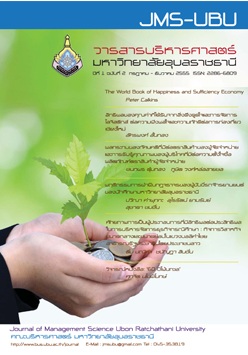อิทธิพลของคุณค่าที่ได้รับจากสิ่งดึงดูดใจและการจัดการโลจิสติกส์ ต่อความพึงพอใจและความภักดีต่อการท่องเที่ยวเชียงใหม่
Main Article Content
บทคัดย่อ
บทความนี้มีวัตถุประสงค์เพื่อตรวจสอบอิทธิพลของคุณค่าที่ได้รับจากสิ่งดึงดูดใจและการจัดการโลจิสติกส์ในการท่องเที่ยวที่มีต่อความพึงพอใจและความภักดีต่อการท่องเที่ยวเชียงใหม่ โดยประยุกต์ใช้แนวคิดความสัมพันธ์เชิงสาเหตุระหว่างคุณค่าที่ได้รับ ความพึงพอใจ และความภักดีต่อแหล่งท่องเที่ยว และใช้แบบจำลองสมการโครงสร้าง (Structural Equation Models: SEM) วิเคราะห์ข้อมูลที่ได้จากการสัมภาษณ์นักท่องเที่ยวต่างชาติ แบบจำลองประกอบด้วยตัวแปรสังเกตได้ 10 ตัวแปร และตัวแปรแฝง 4 ตัวแปร เป็นตัวแปรแฝงภายนอก 2 ตัวแปร คือ คุณค่าที่ได้รับจากสิ่งดึงดูดใจ และการจัดการโลจิสติกส์ ส่วนตัวแปรแฝงภายใน 2 ตัวแปร ได้แก่ ความพึงพอใจและความภักดีต่อการท่องเที่ยวเชียงใหม่
ผลการศึกษา พบว่า คุณค่าที่ได้รับจากการจัดการโลจิสติกส์ในการท่องเที่ยวมีอิทธิพลต่อความพึงพอใจและความภักดีต่อการท่องเที่ยวเชียงใหม่ โดยมีอิทธิพลน้อยกว่าคุณค่าที่ได้รับจากสิ่งดึงดูดใจ 3 เท่า การจัดการการไหลเวียนข้อมูลข่าวสารเป็นองค์ประกอบสำคัญของการจัดการโลจิสติกส์ในการท่องเที่ยวเชียงใหม่ ขณะที่การจัดการการไหลเวียนทางด้านกายภาพและการเงินมีความสำคัญในลำดับรองลงมา ผลลัพธ์ที่ได้แสดงให้เห็นว่า การปรับปรุงระบบโลจิสติกส์ในการท่องเที่ยวเป็นหนึ่งในนโยบายทางเลือกที่สามารถสร้างความประทับใจและเพิ่มโอกาสในการมาเที่ยวซ้ำของนักท่องเที่ยว รวมทั้งการแนะนำให้ผู้อื่นมาท่องเที่ยว และเป็นประโยชน์ต่อการเสริมสร้างความสามารถในการแข่งขันให้กับการท่องเที่ยวของเชียงใหม่
The Effects of Perceived Value from Tourist attractions and Logistics Management on Satisfaction and Chiang Mai Tourism Loyalty
This paper aims to examine the effects of perceived value from tourist attractions and logistics management in tourism on satisfaction and destination loyalty in Chiang Mai. The study applied the concept of causal relationships between perceived value, satisfactions and destination loyalty, and employed the structural equation models (SEM) to analyze the data obtained from interviews with foreign tourists. The model contains 10 observable variables, two exogenous latent variables (perceived value from tourist attractions and logistics management) and two endogenous latent variables (tourists’ satisfactions and Chiang Mai tourism loyalty).
The result of study shows that perceived value from logistics management in tourism influencing tourists’ satisfactions and Chiang Mai tourism loyalty, but the influence is less than the perceived value from tourist attractions 3 times. Information flows management is the most important components of logistics management in Chiang Mai tourism followed by the management of physical and financial flows. These results indicate that improving logistics management in tourism is one of the alternative policies that can be create a good impression, and increase the opportunities of repeat visiting as well as encourage others to visit. These will be benefit to enhance the competitiveness of Chiang Mai tourism.
Downloads
Article Details
บทความที่ตีพิมพ์ในวารสารบริหารศาสตร์ มหาวิทยาลัยอุบลราชธานี เป็นลิขสิทธิ์ของวารสาร โดยเนื้อหาและความคิดเห็นในบทความเป็นความรับผิดชอบของผู้เขียนแต่ละท่าน ไม่เกี่ยวข้องกับคณะบริหารศาสตร์ มหาวิทยาลัยอุบลราชธานีแต่อย่างใด และหากมีข้อผิดพลาดประการใด ผู้เขียนจะเป็นผู้รับผิดชอบต่อบทความของตนเองแต่เพียงผู้เดียว

